-
Why Does "AI" "Art" Suck So Much? - SOME MORE NEWS
YouTube Video
Click to view this content.
Spoiler:
spoiler
It's because of capitalism and fascists.
-
How Degrowth Can Defeat Fascism
YouTube Video
Click to view this content.
by @VladBunea
References and notes: https://vladbunea.substack.com/p/how-degrowth-can-defeat-fascism
-
Consumerism, Control, and the Spectacle: Guy Debord's Critique
YouTube Video
Click to view this content.
>Ever feel like you're watching your life through a screen? Like you're a passive observer in a pre-scripted drama? You're not alone. In this deep dive, we explore Guy Debord's groundbreaking work, "The Society of the Spectacle," and its chilling relevance to our hyper-connected world. We unpack Debord's critique of modern society, where mediated images shape our desires, our relationships, and even our sense of self. Discover how the Spectacle, far from being a mere collection of images, is a powerful force that influences everything from consumerism to politics. We'll examine Debord's analysis of failed socialist ideologies and explore his radical vision for reclaiming our agency and creating a world beyond the Spectacle's seductive grasp. Join us as we delve into the concept of détournement – hijacking the Spectacle's tools and turning them against itself – and explore how we can resist the illusion and live more authentically in the digital age. Prepare to have your perceptions challenged and your understanding of reality transformed. Leave your thoughts and questions in the comments below!
- www.vox.com A “suicide pod” in Switzerland roils the right-to-die debate.
The high-tech future of assisted suicide is here. The world isn’t ready.

-
How America Lost Control of the Bird Flu, Setting the Stage for Another Pandemic
kffhealthnews.org How America Lost Control of the Bird Flu, Setting the Stage for Another Pandemic - KFF Health NewsExclusive reporting reveals how the United States lost track of a virus that could cause the next pandemic. Problems like the sluggish pace of federal action, a deference to industry, and neglect for the safety of low-wage workers put the country at risk of another health emergency.
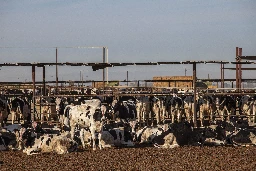
>Farmworker advocates also pressed the CDC for money to offset workers’ financial concerns about testing, including paying for medical care, sick leave, and the risk of being fired. This amounted to an offer of $75 each. “Outreach is clearly not a huge priority,” Boggess said. “I hear over and over from workers, ‘The cows are more valuable than us.’”
- www.scientificamerican.com Great Apes Joke Around, Suggesting Humor Is Older Than Humans
Studies of great apes hint at why and when clowning behavior evolved

-
When Climate Protesters Slow Ambulances They’re Vilified, So Why Are Wealthy Farmers Given a Free Pass?
bylinetimes.com Two-Tier Reporting: When Climate Protesters Slow Ambulances They’re Vilified, So Why Are Wealthy Farmers Given a Free Pass?Media outlets rush to condemn climate change campaigners as "middle class" protesters causing "chaos" while ignoring greater disruption by millionaire landowners

>Too many media outlets rush to condemn those campaigning against fossil fuel chaos as “middle class”. Bizarrely, they do not say the same of millionaire land-owners.
- theconversation.com A ‘doom loop’ of climate change and geopolitical instability is beginning
Climate change is driving inflation and instability, which harms climate action. But it’s not too late to escape the doom loop.

- e360.yale.edu As Disinformation Swirls, Meteorologists Are Facing Threats
Predicting large and dangerous storms has always been challenging. It’s gotten tougher, says meteorologist James Marshall Shepherd, as a growing fringe has started to harass, verbally abuse, and threaten scientists and forecasters who link ferocious weather with climate change.
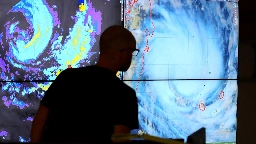
-
The Tragic Optimist's Guide to Surviving Capitalistic Nihilism
YouTube Video
Click to view this content.
>'ello guvna. Feeling crushed under the crippling weight of capitalism's chaos? You're not alone. Let's yap about The Tragic Optimist's Guide to Surviving Capitalistic Nihilism—a journey through despair, hope, and the absurdity of it all. We'll unpack the mental traps of modern society, explore the wisdom of thinkers like James Baldwin, and discover how to embrace optimism without turning a blind eye to the struggles around us. >Because surviving capitalism isn't just about existing—it's about finding meaning amidst the madness. Hope has never been a popular thing. But that doesn't mean it's not worth the attempt.
- www.thenation.com RFK Jr. Is Scary. His Online Fans Might Be Scarier.
To understand RFK Jr.'s rightward shift, we need to examine the Internet culture that fostered his growth—and which the Harris campaign ignored.
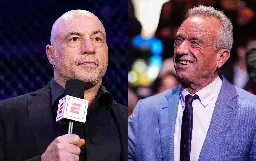
-
Australian police: Watermelons are ‘anti-Semitic’ 🍉
> Australian police stopped a man because his car had 'anti-Semitic' material on the window. When the driver queried what the anti-Semitic material was, the dejected-looking officer replied 'the small watermelon'. The incident is emblematic of how solidarity with Palestine is policed in countries like Australia, the US and Europe, where the individuals tasked with enforcing the law often have very little knowledge about Gaza, Palestine or Israel.
- www.theguardian.com The Taste of War: World War Two and the Battle for Food by Lizzie Collingham – review
Starvation and conflict go hand in hand, Lara Feigel discovers

- nymag.com America’s Alarming Bird-Flu Strategy: Hope for the Best
Two virology professors discuss the lackluster response to an increasingly concerning outbreak.

Broader topic:
> So our public-health infrastructure has wasted a lot of time not doing the right kind of surveillance on this virus. What is a realistic best path forward now, especially considering we’ll have a new presidential administration coming in? > David O’Connor: At the risk of saying something maybe a touch controversial, Tom and I were both commenting earlier that we’d listened to this week’s Ezra Klein podcast where the author of Recoding America was talking about how processes often become a substitute for judgment in terms of what the role of government officials should be. And I think we definitely see this — that a lot of public health is policy-driven. Tom and I see this in our own day-to-day lives. In our state of Wisconsin, farmers produce 30 billion pounds of raw milk a year, and yet it’s taken us five months to get permission to bring several ounces of that raw milk into our secure labs because of biosafety concerns that there might be something in this milk that would pose a risk. Even though it’s the same thing that’s being produced in the tens of billions of pounds per year and is being consumed legally and drunk by people in a dozen states. > > So I think that one place where there may be an opportunity for some common cause in the new administration — where there is a pointed idea that there should be less regulation, that maybe there should be less indexing on process and more on outcomes — would be to look at this with fresh eyes and say, “What are the things that we are really trying to accomplish here? What are the goals?” And then ask the question, “Are the approaches that we’re using being driven by the best science and the best public health? Or is it being driven by other considerations, like we don’t want to step on the feet of another agency that may also have a stake in this response?” > > Public health is something we all need to do. And I’d like to think that maybe we can move things faster if there is a little bit more of an emphasis on outcomes. A lot of things that public health needs to do may be unpopular at the individual level. It may be difficult for individuals, but it’s needed for community health, for literal public health. And maybe in a new administration, an optimistic take is that a reduction in regulation would be one potentially positive outcome that could lead to a more effective response. > > There’s the regulation part, and then there’s the tension between the individual and the communal here in the U.S. > Tom Friedrich: I think that’s true. I would add that there should be incentives, and maybe a new administration would find some will to do this. Because ultimately, we need to incentivize cooperation from farmers and their workers to be able to go into farms and do testing. And something that we’re not really talking about here, but underlies all of this, is just a reduction in trust in governments and institutions generally. If we want to avert a pandemic, if a pandemic is about to happen, then people are going to have to act decisively, and very quickly, it’s going to get out of control. So you have a narrow window of opportunity where by definition you have to be acting with incomplete information. If you’re going to be very deliberative about the whole thing, you’re just not going to be able to contain it.
-
Environmental Crimes in the Amazon Region Often Have Financial Ties to the US, Report Finds
earth.org US Linked to Environmental Crimes in Amazon Region: ReportThe US has been a safe haven for illicit financial flows from environmental crimes due to lax anti money laundering requirements
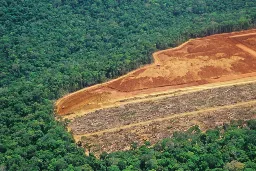
-
Mexico is a leading international pork producer, but Yucatán residents say the waste oozing from hundreds of enormous hog farms is destroying the environment
www.theguardian.com Drugs, hormones and excrement: the polluting pig mega-farms supplying pork to the worldMexico is a leading international pork producer, but Yucatán residents say the waste oozing from hundreds of enormous hog farms is destroying the environment
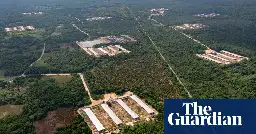
For some reason the "Submit" button just freezes loading, so let's see if I can post it as text:
># Drugs, hormones and excrement: the polluting pig mega-farms supplying pork to the world
>https://www.theguardian.com/environment/2024/nov/25/drugs-hormones-excrement-pig-farms-mexico-water-yucatan